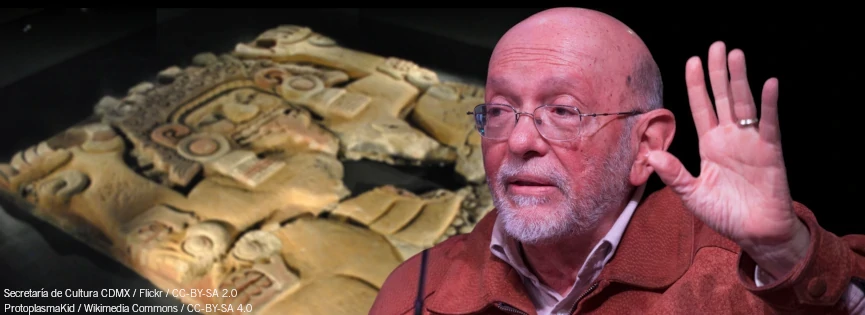Main content
Eduardo Matos Moctezuma 2022 Princess of Asturias Award for Social Sciences

Eduardo Matos Moctezuma was born in Mexico City on 11th December 1940. He graduated in Archaeology from the National School of Anthropology and History (ENAH) and obtained his Master’s degree in Anthropological Sciences, specializing in Archaeology, from the National Autonomous University of Mexico (UNAM), where he also earned his doctorate. He held a chair at the ENAH for more than thirty years, where he taught General Archaeology, Development of Societies, Mesoamerica and History of Archaeology, in addition to heading the Seminario Regional Mexica and the Laboratory of Materials and History of Mexico. He has been director of the National Museum of Anthropology’s Center for Research and Higher Studies in Social Anthropology and the Templo Mayor Museum. He has taught courses and seminars at institutions in a variety of countries.
A scholar and promoter of the Mexican pre-Columbian world, as well as a leading communicator in this field of knowledge, Eduardo Matos Moctezuma has carried out his fieldwork in archaeological sites such as Comalcalco, Tepeapulco, Bonampak, Teotihuacan, Cholula, Tula, Tlatelolco and Tenochtitlan, among others. Some of the most relevant projects he has headed comprise the comprehensive investigation of pre-Columbian, colonial and modern Tula sites, which he directed in the 1970s; Teotihuacan, where he excavated the Pyramid of the Sun and founded the Museum of Teotihuacan Culture and the Center for Teotihuacan Studies; and the city of Tenochtitlan, its sacred precinct and the Templo Mayor, whose discovery and project he coordinated from its beginnings in 1978.
With more than five hundred publications, including articles, reviews, catalogues, guides and biographical sketches, he has also written several books, including Muerte a filo de obsidiana (1975, with twelve editions), The Aztecs (English translation, 1989), La metrópoli de los dioses (1990), Teotihuacán (1994), Life and Death in the Templo Mayor (English translation, 1995), Las piedras negadas (1998), La muerte entre los mexicas (2010), Grandes hallazgos de la arqueología. De la muerte a la inmortalidad (2013) and, his latest, Tlatelolco. La última ciudad, la primera resistencia (2021). Eduardo Matos has been chiefly responsible for disseminating culture thanks to various programmes at Mexican museums aimed at making the contents better known to young people and those with physical or intellectual disabilities. He has likewise curated exhibitions such as “Aztecs” for the Royal Academy of Arts in London and “Isis and Quetzalcoatl” at the Monterrey Forum of Cultures and “Tenochtitlan and Tlatelolco. 500 years after its fall” at the Templo Mayor Museum, both in Mexico.
The holder of honorary doctorates from the University of Colorado and UNAM, Matos is Chevalier of France’s National Order of Merit and Order of Academic Palms, and Officier of its Order of Arts and Letters. He has received the Henry B. Nicholson Medal from Harvard University (USA, 2002), Mexico’s National Prize for Sciences and Arts (2007), the Andrés Bello Order of Venezuela and the Xalapa Museum of Anthropology Medal from the Universidad Veracruzana (Mexico, 2021), among other distinctions. Honorary member of the German Archaeological Institute and the Archaeological Institute of America, emeritus member of Mexico’s Funerary Art Society and member of El Colegio Nacional, the Mexican Academies of Language, History, and National History and Geography, as well as of the Mexican Society for the Study of Religions, he is also a fellow of the Society of Antiquaries of London and member of the Mexican Societies of Geography and Statistics, Anthropologists of the Caribbean and Mexican Writers. In 2017, Harvard University created a chair in his name.
End of main content
